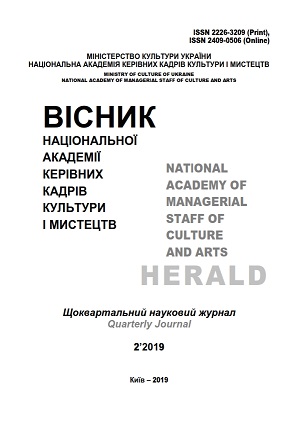Парадигма християнського славослів’я у творчості г. Ф. Генделя
The Paradigm of Сhristian Praise in the Works of G. F. Handel
Author(s): Anzhelika Anatoliyivna TatarnikovaSubject(s): Christian Theology and Religion, Music, 18th Century, Sociology of Religion, History of Art
Published by: Національна академія керівних кадрів культури і мистецтв
Keywords: choral art G. F. Handel; «Te Deum “Dettingen”»; english choral music; christian praise;
Summary/Abstract: The purpose of the article is the identification of the poetic-intonational uniqueness of «Te Deum “Dettingen”» by G. F. Handel in line with the christian worship tradition. The methodology is based on the intonational concept of music from the perspective of intonational-stylistic, etymological analysis inherited from B. Asafiev and his followers, as well as on interdisciplinary and historicalcultural approaches. The latter allow revealing the spiritual-semantic and stylistic specifics of «Te Deum “Dettingen”» by G. F. Handel in the context of not only the individual author's style, but also the evolutionary paths of the spiritual choral art of Europe. The scientific novelty of the work is determined by the fact that it first summarized the poetics of «Te Deum “Dettingen”» by G. F. Handel in the spirit of the christian worship tradition. Conclusions. Choral art G. F. Handel is associated with England, its political, cultural, historical and choral tradition. One of the “signs” of this connection can be considered his five compositions on the texts of Te Deum (in the english version). The two largest Handel Te Deum – Utrecht (1713) and Dettingen (1743) – are dedicated to ending the war of the spanish inheritance and the victory of the british and allied austrian troops over the french near Dettingen. «Te Deum “Dettingen”» by G. F. Handel was born at the intersection of, on the one hand, the arsenal of musical rhetoric, coupled with images of glory, praise (quarterliness, trumpet sounds, d major, etc.), on the other – appealing to the invoice-intonation formulas of spiritual and singing praise of praise, genetically going back to the tradition of the early middle ages, in particular, to ambrosian singing (antiphon, responsory, melismatic anniversary singing, etc.).
Journal: Вісник Національної академії керівних кадрів культури і мистецтв
- Issue Year: 2019
- Issue No: 2
- Page Range: 438-443
- Page Count: 6
- Language: Ukrainian

